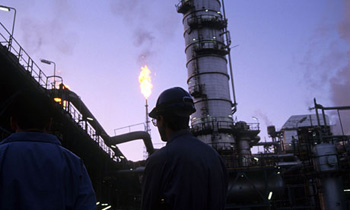 Reuters: Decades of sanctions have stunted Iran’s oil and gas sector, which dominates its economy.
Reuters: Decades of sanctions have stunted Iran’s oil and gas sector, which dominates its economy.
By Jon Hemming
 LONDON Nov 1 (Reuters) – Decades of sanctions have stunted Iran’s oil and gas sector, which dominates its economy.
LONDON Nov 1 (Reuters) – Decades of sanctions have stunted Iran’s oil and gas sector, which dominates its economy.
The United Nations has imposed four rounds of sanctions against Iran in the last four years to try to curb a nuclear programme the West suspects is a cover for secretly developing an atomic weapons capability.
Iran says it only wants nuclear power plants to generate electricity for domestic consumption so it can export more of its large reserves of oil and gas.
The United States and the European Union imposed additional sanctions of their own this year, tightening restrictions on the supply of gasoline to Iran and financial transactions with the Islamic Republic. Factbox detailing sanctions
WHAT DO THE NEW SANCTIONS DO?
United Nations sanctions agreed in June impose measures against more Iranian banks abroad if a connection to the nuclear or missiles programme is suspected, as well as blocking transactions with any Iranian bank, including the central bank.
U.S. and EU sanctions go further.
The U.S. tightened sanctions against Iran’s oil and gas sector and now restricts not just its own companies, but the U.S. operations of international firms that supply fuel to Iran.
European Union sanctions officially published last week target Iran’s strategic oil and gas industry, starving it of technical assistance and investment.
EU sanctions do not prohibit the import or export of Iranian oil and gas, nor the payments for that trade.
However, financial transactions with Iran of as little as 40,000 euros ($55,880) require authorisation.
Together with the added bureaucracy, the risk of flouting U.S. sanctions and the range of available crudes in a well-supplied market, that is likely to put some European firms off trading with Iran for now at least.
HOW HAVE INTERNATIONAL FIRMS REACTED?
U.S. energy firms have not traded with Tehran since the mid-1990s and European firms have been gradually pulling out of energy projects in Iran due to the threat of U.S. sanctions and the problems of dealing with Iranian bureaucracy.
Asian energy companies, notably from China, have stepped in, but top Chinese firms have slowed work on projects in Iran as their increasing involvement in projects in the United States could come under legal threat.
The number of international companies pulling out of trade with Iran or failing to renew contracts is growing, while companies still dealing with Iran are mostly only at the negotiations stage.
Oil trade with China and Japan, two of Iran’s biggest markets, has also gone down.
Several oil companies have stopped selling fuel to Iranian passenger jets at some European airports, forcing the planes to stop elsewhere to refuel. Iran’s state-owned carrier has threatened legal action.
WHAT EFFECT ARE THE SANCTIONS HAVING ON IRAN?
Iran insists the sanctions are not hurting its economy and will do nothing to halt its nuclear work. Iranian President Mahmoud Ahmadinejad said the sanctions were like a “used handkerchief that should be thrown into the waste bin”.
Although OPEC’s second biggest oil exporter, Iran has for years imported up to 40 percent of its gasoline needs.
U.S. sanctions from the mid-1990s have meant Tehran has not been able to increase its refining capacity and meet the demands of a growing population, which sees cheap fuel as a birthright.
Iran stockpiled gasoline ahead of U.S. and EU sanctions coming into effect in July, paying as much as 25 percent above the market rate to do so. Since then, gasoline exports to Iran have dwindled.
Tehran says it has switched production at petrochemical plants to make gasoline and no longer needs to import the fuel. Indeed, it says it now has enough gasoline to export it.
Analysts say such measures may work in the short-term, but later the low quality fuel from petrochemical plants will damage engines.
The shift may also lead to shortages of essential petrochemicals and the plants themselves may suffer technical problems by doing a job they were designed to do.
The sanctions have increased pressure on Ahmadinejad to phase out $100-billion of fuel and food subsidies, a plan that has been delayed several times by opposition within official ranks due to worries about a backlash over increased inflation.
Iran’s Central Bank says inflation is running at 8.9 percent, but analysts argue the unofficial inflation rate is more than 30 percent and parliament’s research centre said in September it was around 50 percent.
So far though, the sanctions appear to be having a limited effect on Iran’s willingness to negotiate on its nuclear programme. Last week, Iran said it was willing to resume talks with world powers, but not about its nuclear programme.
(Editing by Barbara Lewis)


